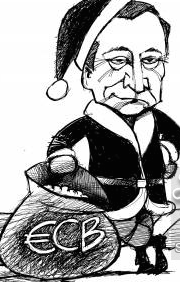The ECB meets tomorrow. Few, if any, are expecting fresh action.
The economy has progressed broadly along the lines that ECB anticipated. Growth is stable near trend levels. While deflationary pressures have eased, price increases remain minimal. At 0.4% year-over-year, eurozone CPI, officials cannot be content with the progress.

Moreover, the latest bank lending survey was disappointing. Credit conditions have weakened for the third consecutive quarter. The Composite Index fell to 12.67 in Q3 from 12.75 in Q2 and off from the 16.4 high in Q2 15. Despite the access to cheap funds via TLTRO II, bank lending to households has slowed from earlier in the year. The growth of loans non-financial businesses also appears to have lost some momentum recently.
If the ECB did not seize upon the window of opportunity last month to provide more support, it most likely would not do so now. The most likely scenario is that while Draghi may lay some groundwork, any fresh action will likely wait until December when the staff forecasts are updated.
What is difficult for many investors to come to grips with is that Draghi and many other ECB officials, even if not all of them, support the combination of orthodox and unconventional policies, and regard them as effective. That is an important recognition. It means that ideas that the ECB will call an end to its efforts because they are ineffective are probably a non-starter from an intellectual and investment perspective. The issue is not really whether the ECB runs to the exit, but rather what it does next. The lens is not what it ought to do, but what it is likely to do.
Although the talk of tapering ran through the market like pink eye in a grammar school, few truly think that is a realistic scenario now. A Bloomberg survey found 97% of the (50) economists surveyed expected the asset purchases to be extended beyond the soft March 2017 end date. Nearly as many (90%) expect the announcement at the December 8 ECB meeting.













Leave A Comment